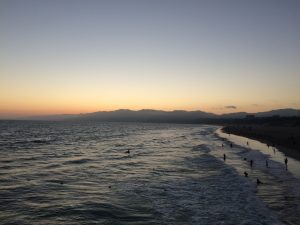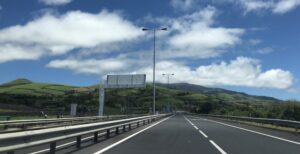On Thanksgiving Day, the roads to Gaby Walton’s (COL ’20) home in Malibu, California, were closed. Walton does not normally return home for Thanksgiving due to the distance, however this year, she didn’t have a choice. Her home was safe, but the city around it had burned in the Woolsey wildfire.
Every day of November this year, an active wildfire raged in California. The Camp fire in the north of the state was the most destructive wildfire in California history. Meanwhile, the Woolsey fire ravaged parts of the south of the state in and around Thousand Oaks, California, the site of a recent mass shooting.
Jackie Nowakowski (COL ’20) said that the pain of the fire was sharpest at the community level. Nowakowski has lived in Woodland Hills, the next town over from Thousand Oaks, her whole life. “My first house burned, my best friend’s home burned. I think 80 percent of my high school [district] was evacuated,” she said.
Nowakowski said that the fire has eclipsed the tragedy of the shooting on Nov. 7. The community barely had time to process the deaths of the 12 people killed inside a Thousand Oaks bar before it had to deal with the fires. “There’s been so much happening,” Nowakowski said. “And now they’re talking about mudslides.” The fire left hillsides vulnerable to rainstorms, increasing the risk of further disaster.
Walton is also from Southern California, and her father was directly affected by the fires. He stayed at their home in Malibu on the university campus where he teaches. “They were evacuated to the library and basically stayed there for two days,”
Walton said. “I think all of Malibu was under mandatory evacuation except the university said everyone should stay there.” While city firefighters worked to protect those on the campus, neighborhoods close to the university were wiped out.
Walton spoke to her father frequently during and after the fire. As his classes were cancelled, he found himself at a loss for what to do. “The power wasn’t on for a long time, and he couldn’t leave campus, so he couldn’t go to the store or to do anything, so he was just kind of trapped on the street with the other neighbors, and it was really smoggy, the air was terrible, they were all wearing facemasks,” Walton said. “It’s better now they’ve opened the roads and everything.”
Nowakowski said her friends who remained at home expressed feelings of emptiness. “Everyone feels numb,” she said. Even after the town was mostly evacuated, people began to return for fear of looting.
Toria Sullivan (NHS ’19) is from Indiana, not California, but the wildfires have affected her family, too. Her aunt and uncle live in Malibu, and her uncle’s house burned down, along with several in her aunt’s neighborhood. While it is not Sullivan’s home, she feels a connection to it, having stayed there one summer in high school. “It’s very wild to think that it could just be a matter of living across the street from someone and one house making it and another house not,” she said. “It was a beautiful, beautiful community.”
While her aunt and cousin evacuated to Los Angeles, her uncle stayed behind with some friends to put out embers in his neighborhood. “It’s not necessarily an endorsed idea, but they did that and were able to apparently save three houses in the neighborhood,” Sullivan said. While her family has not heard from him recently, they know there are people chartering boats from Los Angeles to Malibu beaches to deliver provisions to those who stayed behind.
The experience has reinforced some of Sullivan’s existing interests at Georgetown, such as climate policy. “It motivates me to take climate change more seriously,” she said. She questioned how the government’s response to the California wildfires has differed from its reactions to other natural disasters. “California is burning, but there wasn’t necessarily the emergency response we would see if there was a hurricane,” she said.
Nowakowski felt this disparity was echoed in the attitudes toward the disaster on campus. She said she had not seen any efforts by the university or any clubs to reach out to students that were affected like there has been in response to past natural disasters. “It’s moving on to fires being California’s natural disasters,” she said. Nowakowski said she would appreciate more support from the university, and she thinks other students would, too.
A spokesperson for the university wrote in an email to the Voice, “Residential Advisors, Residential Ministers, and Student Affairs staff are always ready to connect students with resources on campus. We encourage any students impacted by the wildfires in California to reach out so that the university can provide support.”
With their families so far away, Nowakowski, Walton, and Sullivan all said they had lacked the support that would have made the experience just a little easier to deal with. “I’m the only one from my friend group from California,” Nowakowski said. It has been hard to explain to people how close the fire was to her home, and how it has affected her. Her friends have often made jokes about “we have snow days, and you have fire days,” she said, because fires are so common. But this was different. “It’s never been this awful and prolonged,” she said.
Even after Walton knew her father would be okay, she said the weekend during the height of the fire was difficult for her. “I was stressed, I had to call and be like, ‘If you do have to leave, I’d like you to take some money and some jewelry.’ I had a weekend of doing nothing. I did no homework,” she said. Her friends helped her get through the weekend, and she is glad the worst is over.
For Sullivan, it is not just her family’s possessions that could be lost, but their history as well. “My uncle had a large collection of my great-grandmother’s paintings. She was a folk artist, and so our family lost a big part of our history with that potentially,” she said. “We don’t know how many paintings he had or how many he was able to get out.”
Though families are still dealing with the aftermath of the fire, many people have turned their eyes to the future. Walton is sure California will continue to confront wildfires. “When you’re driving through California, it’s just hills of dead grass, so it’s kindling,” she said.
Still, Walton is taking this time to appreciate her family’s safety. “It was scary and a little stressful. I’m glad it’s over,” she said. “I’m glad I didn’t lose my house.”
When Nowakowski returns home for winter break, she anticipates that her hometown will have changed significantly. “While the fire was devastating and even though I have seen pictures, it still does not seem entirely real,” she wrote in an email to the Voice. “Going home and seeing the burnt remnants of people’s homes and the actual day-to-day reality of how the community will have to rebuild will put the absolute devastation wreaked by the fire in stark relief.”







